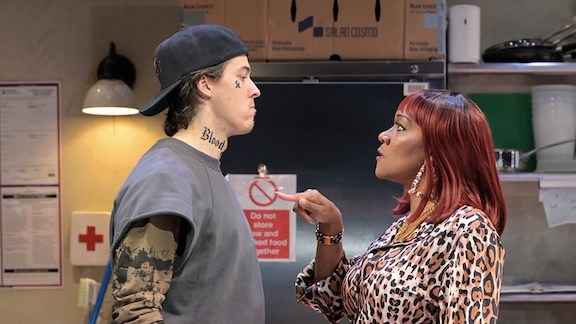
The beautifully balanced ensemble of five actors who play the owner and staff of a truck stop diner in “Clyde’s” are provided with a bumper crop of fresh, zesty dialogue by Pulitzer-winning playwright Lynn Nottage (“Sweat,” “Intimate Apparel”). Then they serve it up with comic spice and energetic sizzle in an undeniably crowd-pleasing production under the sprightly direction of Taylor Reynolds.
The fun plays out on a set by Wilson Chin that’s so meticulous in its kitchen-sink realism that it practically begs for an Olfactory Design that allows audiences to smell the burgers being flipped on the flattop. Other than the visually, realism is not the day’s special at Clyde’s. While the show has more weight and style than a television sit-com, its characters are written to deliver well-crafted belly-laughs more than grit or gravitas.
April Nixon plays Clyde, the joint’s diabolically demanding proprietor, with a serrated sharpness that she insists is necessary to keep her employees- all ex-convicts, like herself -in line and out of jail.
But she’s forever treading a fine line between tough love and sadism, and doing so on high heels, in questionably appropriate outfits, and with a side order of unquestionably inappropriate innuendo. Her bling-trimmed Trashi Labelle lewks are by Karen Perry (costumes) and Megan Ellis (hair, wigs, make-up) whose creations for the entire cast are character-perfect.
One of Clyde’s underlings, the guileless, romantic recovering drug addict Rafael (Wesley Guimaraes) describes his boss as “a licensed dominatrix.” Another, the wary and emotionally repressed Jason (Louis Reyes McWilliams), accurately assesses behavior Clyde calls well-meaning as instead being flat out “mean.”
Jason, a face-tatted white man with anger issues obscuring a sensitive soul, arrives in the kitchen eco-system as a new hire, inherently suspect and initially hazed by Rafael and Letitia (Cyndii Johnson), a teddy-bear-toting single mother who’s done time for robbing a pharmacy because she couldn’t afford to buy seizure drugs for her baby daughter.
And then there’s Monty, the preternaturally cool, dashiki-clad O.G. sandwich man who serves as father figure to this motley- and ultimately mushy -kitchen crew. Played with Zen-master intonations by Harold Surratt, he quietly serves as a peace-keeping buffer between his immature 20-something coworkers and condescending Clyde.
To instill motivation and aspiration in the younger trio, Monty engages them in a ritual competition to conceive of and construct the world’s most sublime sandwich. While filling customer orders for mundane ham-on-wheats and grilled cheeses that Clyde hands across a pass-through, they prayerfully recite the ingredients of imagined masterpieces.
Haloumi cheese, apricot chutney, barbecued duck, rosemary focaccia and other edible bourgeois exotica are the signposts in these fleeting reveries, pointing to worlds beyond the impoverished, hand-to-mouth parolee lives these folks are currently living.
Its all very funny. But a bit of a headscratcher, too. Is a life of Gray Poupon-dom really what characters like these should be striving for?
When Monty’s own long-ago crime is revealed, his transgression turns out to have been a an act of love and self-sacrifice; victimless except for Monty himself. Perhaps playwright Nottage wanted us to consider how unfairly some of her characters have been treated by the American legal system.
But some of them have committed offenses that seem almost inoffensive, others suffer from excruciatingly guilty consciences, and the script offers much more in the way of tasty laugh-out-loud snacks than fibrous sociopolitical nourishment.
“Clyde’s” isn’t sharp satire; its cuddling edge comedy.
